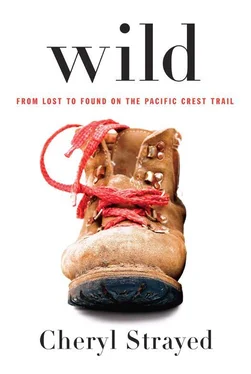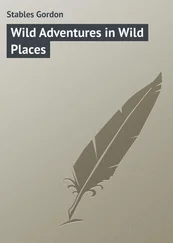Cheryl Strayed - Wild
Здесь есть возможность читать онлайн «Cheryl Strayed - Wild» весь текст электронной книги совершенно бесплатно (целиком полную версию без сокращений). В некоторых случаях можно слушать аудио, скачать через торрент в формате fb2 и присутствует краткое содержание. Год выпуска: 2012, ISBN: 2012, Жанр: Современная проза, на английском языке. Описание произведения, (предисловие) а так же отзывы посетителей доступны на портале библиотеки ЛибКат.
- Название:Wild
- Автор:
- Жанр:
- Год:2012
- ISBN:978-0-307-95765-8
- Рейтинг книги:4 / 5. Голосов: 1
-
Избранное:Добавить в избранное
- Отзывы:
-
Ваша оценка:
- 80
- 1
- 2
- 3
- 4
- 5
Wild: краткое содержание, описание и аннотация
Предлагаем к чтению аннотацию, описание, краткое содержание или предисловие (зависит от того, что написал сам автор книги «Wild»). Если вы не нашли необходимую информацию о книге — напишите в комментариях, мы постараемся отыскать её.
Wild — читать онлайн бесплатно полную книгу (весь текст) целиком
Ниже представлен текст книги, разбитый по страницам. Система сохранения места последней прочитанной страницы, позволяет с удобством читать онлайн бесплатно книгу «Wild», без необходимости каждый раз заново искать на чём Вы остановились. Поставьте закладку, и сможете в любой момент перейти на страницу, на которой закончили чтение.
Интервал:
Закладка:
The blue sky was everywhere above me, the sun bright and unrelenting, scorching me even through my hat and the sunscreen I rubbed into my sweaty face and arms. I could see for miles — snowy Lassen Peak nearby to the south and the higher and snowier Mount Shasta rising far to the north. The sight of Mount Shasta filled me with relief. I was going there. I would walk past it and beyond it, all the way to the Columbia River. Now that I’d escaped the snow, it seemed nothing could take me off course. An image of myself hiking with ease and alacrity through the rest of the miles formed in my mind, though the shimmering heat soon eradicated it, reminding me that I knew better. If I made it to the Oregon-Washington border, I knew it would only be with all the hardships that moving at foot speed beneath a monster of a pack entailed.
Foot speed was a profoundly different way of moving through the world than my normal modes of travel. Miles weren’t things that blazed dully past. They were long, intimate straggles of weeds and clumps of dirt, blades of grass and flowers that bent in the wind, trees that lumbered and screeched. They were the sound of my breath and my feet hitting the trail one step at a time and the click of my ski pole. The PCT had taught me what a mile was. I was humble before each and every one. And humbler still that day on Hat Creek Rim as the temperature moved from hot to hotter, the wind doing little more than whip the dust into swirls at my feet. It was during one such gust that I heard a sound more insistent than any caused by the wind and realized that it was a rattlesnake shaking its rattle hard and near, warning me off. I scrambled backwards and saw the snake a few steps ahead of me on the trail, its rattle held like a scolding finger slightly above its coiled body, its blunt face darting in my direction. If I’d taken another few steps, I’d have been upon it. It was the third rattlesnake I’d encountered on the trail. I made an almost comically wide arc around it, and continued on.
At midday I found a narrow patch of shade and sat down to eat. I took my socks and boots off and reclined in the dirt to prop up my swollen and battered feet on my pack, as I almost always did on my lunch break. I stared at the sky, watching the hawks and eagles that soared in serene circles above me, but I couldn’t quite relax. It wasn’t only because of the rattlesnake. The landscape was barren enough that I could see for great distances, though I kept having the vague feeling that something lurked nearby, watching me, waiting to pounce. I sat up and scanned the terrain for mountain lions, then lay back down, telling myself that there was nothing to fear, before I quickly sat up again at what I thought was the snap of a branch.
It was nothing, I told myself. I was not afraid. I reached for my water bottle and took a long drink. I was so thirsty that I chugged it until it was empty, then I opened the other one and drank from that too, unable to stop myself. The thermometer that dangled from the zipper on my pack said it was 100 degrees in my shaded patch.
I sang cool songs as I walked, the sun beating me as if it had an actual physical force that consisted of more than heat. Sweat collected around my sunglasses and streamed into my eyes, stinging them so I had to stop and wipe my face every now and then. It seemed impossible that I’d been up in the snowy mountains wearing all of my clothes only the week before, that I’d awakened to a thick layer of frost on my tent walls each morning. I couldn’t rightly remember it. Those white days seemed like a dream, as if all this time I’d been staggering north in the scorching heat into this, my fifth week on the trail, straight through the same heat that had almost driven me off the trail in my second week. I stopped and drank again. The water was so hot it almost hurt my mouth.
Sagebrush and a sprawl of hardy wildflowers blanketed the wide plain. As I walked, scratchy plants I couldn’t identify grazed my calves. Others I knew seemed to speak to me, saying their names to me in my mother’s voice. Names I didn’t realize I knew until they came so clearly into my mind: Queen Anne’s lace, Indian paintbrush, lupine — those same flowers grew in Minnesota, white and orange and purple. When we passed them as we drove, my mother would sometimes stop the car and pick a bouquet from what grew in the ditch.
I stopped walking and looked up at the sky. The birds of prey still circled, hardly seeming to flap their wings. I will never go home , I thought with a finality that made me catch my breath, and then I walked on, my mind emptying into nothing but the effort to push my body through the bald monotony of the hike. There wasn’t a day on the trail when that monotony didn’t ultimately win out, when the only thing to think about was whatever was the physically hardest. It was a sort of scorching cure. I counted my steps, working my way to a hundred and starting over again at one. Each time I completed another set it seemed as if I’d achieved a small thing. Then a hundred became too optimistic and I went to fifty, then twenty-five, then ten.
One two three four five six seven eight nine ten .
I stopped and bent over, pressing my hands to my knees to ease my back for a moment. The sweat dripped from my face onto the pale dirt like tears.
The Modoc Plateau was different from the Mojave Desert, but it didn’t feel different. Both teemed with jagged desert plants while being entirely inhospitable to human life. Tiny gray and brown lizards either zipped across the trail as I approached or held their position as I passed. Where did they get water? I wondered, trying to stop myself from thinking about how hot and thirsty I was. Where would I ? I was three miles away from the water tank, I reckoned. I had eight ounces of water left.
Then six.
Then four.
I forced myself not to drink the last two until I had the water tank in sight and by 4:30 there it was: the stilted legs of the burned fire lookout on a rise in the distance. Nearby was a metal tank propped up against a post. As soon as I saw it, I pulled out my bottle and drank the last of my water, thankful that in a matter of minutes I’d be able to drink my fill from the tank. As I approached, I saw that the wooden post near the tank was covered with something that flapped in the wind. It looked like several shredded ribbons at first and then a ripped cloth. It wasn’t until I got up close that I saw they were tiny scraps of paper — notes stuck to the post with duct tape and now fluttering in the wind. I lurched forward to read them, knowing what they would say even before my eyes met the paper. They said what they said in various ways, but they all bore the same message: NO WATER.
I stood motionless for a moment, paralyzed with dread. I gazed into the tank to confirm what was true. There was no water. I had no water. Not even a sip.
Nowaternowaternowaternowaternowaternowater .
I kicked the dirt and grabbed fistfuls of sage and threw them, furious with myself for yet again doing the wrong thing, for being the same idiot I’d been the very day I set foot on the trail. The same one who had purchased the wrong size boots and profoundly underestimated the amount of money I’d need for the summer, and even maybe the same idiot who believed I could hike this trail.
I pulled the ripped-out guidebook pages from my shorts pocket and read them again. I wasn’t scared in the same way I’d been earlier in the day, when I had the funny feeling that something was lurking nearby. Now I was terrified. This wasn’t a feeling. It was a fact: I was miles from water on a hundred-and-something-degree day. I knew that this was the most serious situation I’d been in so far on the trail — more threatening than the marauding bull, more harrowing than the snow. I needed water. I needed it soon. I needed it now. I could feel that need in my every pore. I remembered Albert asking me how many times I urinated each day when I’d first met him. I hadn’t peed since I’d left Old Station that morning. I hadn’t needed to. Every ounce I’d ingested had been used. I was so thirsty I couldn’t even spit.
Читать дальшеИнтервал:
Закладка:
Похожие книги на «Wild»
Представляем Вашему вниманию похожие книги на «Wild» списком для выбора. Мы отобрали схожую по названию и смыслу литературу в надежде предоставить читателям больше вариантов отыскать новые, интересные, ещё непрочитанные произведения.
Обсуждение, отзывы о книге «Wild» и просто собственные мнения читателей. Оставьте ваши комментарии, напишите, что Вы думаете о произведении, его смысле или главных героях. Укажите что конкретно понравилось, а что нет, и почему Вы так считаете.












